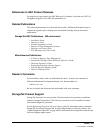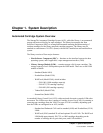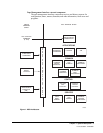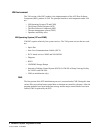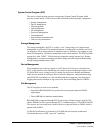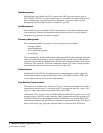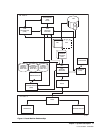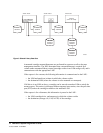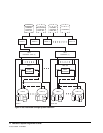
Chapter 1. System Description 7
1st ed., 6/30/04 - 312579601
System Control Program (SCP)
The service virtual machine executes a proprietary System Control Program which
provides a small subset of MVS services that include the following major components:
• Storage management
• Device management
• File management
• Task management
• Job management
• Processor management
• Communication
• Inter-machine communication
• Task recovery/termination.
Storage Management
The storage managed by the SCP is a single ‘‘real’’ storage range; no virtual storage
management is performed. The maximum amount of storage that is available to a user is
16 megabytes, but in actual practice 8 megabytes may be sufficient. Any paging or page
faults are managed by VM and are transparent to the virtual machine. The SCP associates
storage keys with ‘‘JOBS’’. VM job steps are mapped to unique storage keys. Storage
Management is a matter of managing available storage and allocating and deallocating
storage through standard macro calls.
Device Management
This component has exclusive control over SCP driven I/O activity to virtual devices.
IUCV is the interface to the DASD data sets which are accessed through requests to the
CP BLOCKIO service (using device I/O mainly for the Reserve-Release mechanism).
Other devices include several spool files for console, diagnostic, and performance logs,
and DASD I/O for minimal use. Also included with this component is the function of
logging unsuccessful attempts to log errors to the Error Recording Data Set (ERDS).
File Management
The SCP supports several access methods:
• Sequential (BSAM/QSAM) for spooled unit record input/output and DASD
input/output
• Direct (BDAM) for data base manipulation.
BSAM/QSAM is supported through EXCP processing of channel control word (CCW)
chains. BDAM files are accessed through IUCV communication to CP DASD BLOCKIO.
The requests are converted from a relative block to a physical block on DASD which is
passed to BLOCKIO.
No DASD file allocation is performed. All DASD data sets must be preallocated
OS-format data sets or CMS ‘‘reserved’’ minidisks.



